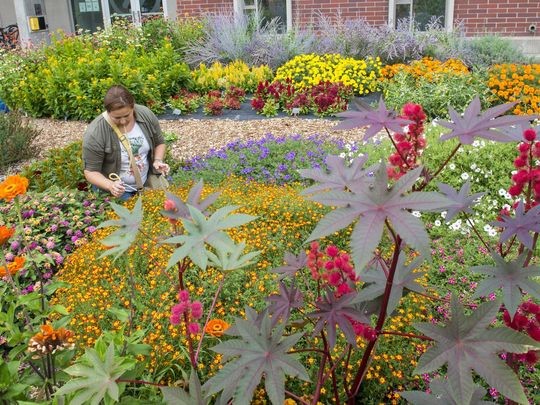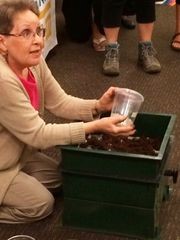
By Kym Pokorny
Kris LaMar and Barb Cary live at opposite ends of Oregon and have never met, but they’ve got a lot in common.
Both women are up to their trowels as Master Gardeners.
A shade under 3,000 Oregonians join the two women who went through the intensive two- to three-month course that covers everything from soils to disease diagnosis. In return, they agreed to volunteer to advise gardeners and potential gardeners with the research-based information they learned in class. The program — part of Oregon State University Extension Service — reached over 100,000 people in 2017.
“Becoming a Master Gardener is a fantastic way to increase your knowledge of sustainable gardening, to meet like-minded gardeners and to give back to your community,” said Gail Langellotto, statewide coordinator of Oregon State University Extension Service’s Master Gardener program. “People are excited about growing their own food and gardening for wildlife. Master Gardeners help people understand how to meet their goals in a way that protects and conserves natural resources.”

LaMar, who has been a Master Gardener for five years, knew nothing about the program until she saw something about it in the newspaper. At the same time, she was qualifying to be a Master Recycler. Once she got her hands into compost and saw the overlap, she was hooked. She took both courses and has become one of the most active Master Gardener volunteers, teaching classes, monitoring the Clackamas County speakers bureau and, most of all, answering hundreds of questions — 2,200 since she started a little over a year ago — in Ask an Expert, an online question and answer service through the extension.
“I can stay home in my jammies,” she said. “I don’t have to drive. I can answer questions from all over the world. It’s wonderful because I get to learn all this, too. Like an insect that lives in Mozambique or India or Norway. I’ve found my niche. I can’t think of a better way to spend my time.”
LaMar makes a good point. Master Gardeners don’t stop learning after finishing the course. When they can’t immediately diagnose and solve a problem, they turn to the wealth of research from OSU, other universities and reputable sources.
The breadth of activities Master Gardeners do for volunteer hours is wide. Some answer questions via email or phone hotlines, Langellotto said. Others spend time teaching in learning gardens, community gardens, even correctional institutions. Cary, a Master Gardener since 2013, works in a preschool that’s next door to a food bank where she volunteered.
“They jumped on it,” she said.
For an hour a week for 18 weeks, Cary spends time with 3 and 4 year olds, reading books, germinating seeds, planting, watering and harvesting. A tomato taste test is always a winner.
“It’s fun, so fun,” she said. “The little kids are really engaged, and we get positive feedback from the parents. We use it as a carrot for good behavior, and it works.”
You don’t have to be an experienced gardener to sign up for the classes. In fact, many people join to learn more about their own garden. LaMar, who was a judge in Portland for 25 years, grew houseplants and container plants. Cary was too busy during her career days to garden, but once she retired and moved from Orange County, California, to Brookings, she got busy. Both said being a Master Gardener has helped enormously.
While Cary took the class in person, LaMar took the online course — a new option — and recommends it to people who can’t make it to classes.
“Master Gardeners tend to be retired,” she said. “I’d like to see more young people get involved, and the online course offers that flexibility.”
 Master Gardeners are community members with an active interest in gardening. We are enthusiastic about gardening and willing to learn, and in turn, help other community members improve their gardening skills. As a Oregon State Master Gardener™ volunteer, we have access to advanced training from university researchers and horticultural specialists.
Master Gardeners are community members with an active interest in gardening. We are enthusiastic about gardening and willing to learn, and in turn, help other community members improve their gardening skills. As a Oregon State Master Gardener™ volunteer, we have access to advanced training from university researchers and horticultural specialists.
After completing the Master Gardener training, we volunteer throughout Lincoln County reaching out to community members at our five demonstration gardens, spending time at our plant clinic help desk working on real garden issues, promoting the benefits and joys of gardening at community events, and of course, working with other gardening enthusiasts.
Join us as a Lincoln County Master Gardener. You’ll become a better gardener and have fun doing so.
In Lincoln County, the traditional course commits participants to 60 volunteer hours after completing the in-classroom series. Registration is taking place now for classes beginning on Jan. 10. For more information, contact [email protected] or 541-283-5119.
Kym Pokorny, 541-737-3380, [email protected] and on Twitter @OregonStateExt





